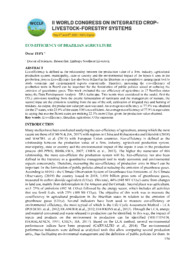Eco-efficiency of brazilian agriculture.
Eco-efficiency of brazilian agriculture.
Author(s): TUPY, O.
Summary: Eco-efficiency is defined as the relationship between the production value of a firm, industry, agricultural production system, municipality, state or country and the environmental impact of the inputs it uses in the production process Eco-efficiency has also been defined in the literature as a quantitative management tool to study economic and environmental aspects concurrently. Therefore, measuring the eco-efficiency of production units in Brazil can be important for the formulation of public policies aimed at reducing the emission of greenhouse gases. This work evaluated the eco-efficiency of agriculture in 27 Brazilian states using the Data Envelopment Analysis DEA technique. Two inputs were considered in the model, first the CO2e emissions resulting from the enteric fermentation of ruminants and the management of manure, the second input are the emissions resulting from the use of the soil, cultivation of irrigated rice and burning of residues. As output, the production value per state was used. An average eco efficiency of 77.9% was obtained for the 27 states, with 25.9% of the states 100% eco-efficient. An average eco-efficiency of 77.9% is equivalent to saying that eco-inefficient states are emitting 22.1% more CO2e, given the production value obtained.
Publication year: 2021
Types of publication: Paper in annals and proceedings
Keywords: Brazilian agriculture, CO2e emissions, Eco efficiency
Observation
Some of Embrapa's publications are published as ePub files. To read them, use or download one of the following free software options to your computer or mobile device. Android: Google Play Books; IOS: iBooks; Windows and Linux: Calibre.
Access other publications
Access the Agricultural Research Database (BDPA) to consult Embrapa's full library collection and records.
Visit Embrapa Bookstore to purchase books and other publications sold by Embrapa.

